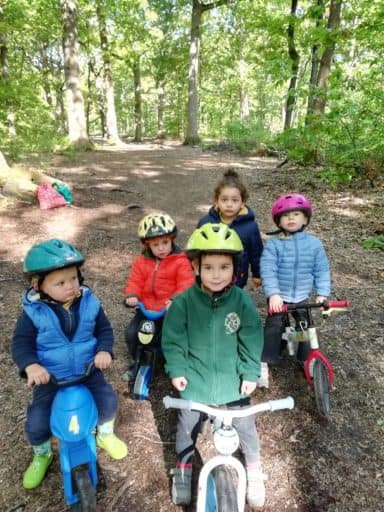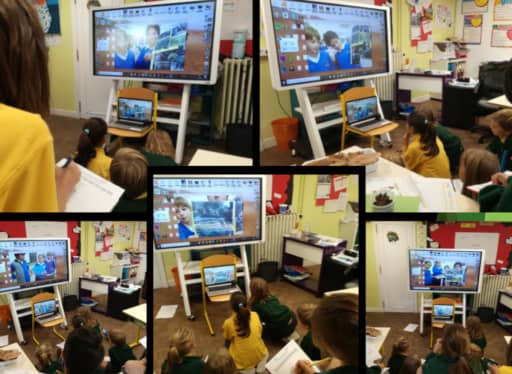Peer-to-Peer Teaching
Little Chestnuts and Willows were very excited to be able to become teachers for a day as we visited other classes such as Maple, Walnut and Birch in order to teach them about various types of materials! Coming in with our mystery bags filled with varied materials such as wood, glass, plastic, rubber, paper and fabric gathered on our material hunts around the school, the children proudly presented each material, asking if the other pupils could recognise them all the while providing some examples of where to find such a material 😊 Bravo to our little forest teachers!

The Early Years and Preschool sections were also visited by older students in order for them to teach us about the exciting project they are building in Middle School: an Eco-Tree, a structure made from materials such as plastic, paper and cardboard in order to recycle these materials and raise awareness of how we can use / re-use materials. This perfectly fit in with our What’s it Made Of theme and our little ones were so very proud to be able to actively participate in the conversation as they recognised various materials and could engage with the other children as well as ask questions.

Research has shown that peer-to-peer teaching is an invaluable asset which promotes confidence, develops social skills, increases communication and encourages problem solving which are all fundamental to children’s development.
Recycling our Christmas tree
In the Chestnut and Willow classes we couldn’t bear to throw our Christmas tree out! We felt it was quite wasteful to use a real tree to decorate it for less than a month only to get rid of it and so we decided to roll our sleeves up and give our beloved tree a second life by recycling its various parts! We repurposed the trunk and foot into fun building blocks and incorporated them into various art projects while the needles will be turned into a natural pulp which we will then add to the soil once it gets a little warmer in order to create our own compost and nourish the earth with nutrients 😊 Teaching children about recycling and how we can repurpose elements is a crucial life lesson to start early on if we want them to be able to see the world as a connected whole which can continuously feed itself all the while reducing unnecessary waste by finding innovative and often simple solutions.

Material Faces
Could my eyes be made out of wood? My mouth from metal and my hair out of fabric? Challenge accepted! Indeed, little Chestnuts and Willows created such beautiful self-portraits out of samples of various materials they picked themselves out of materials we could gather around such as wood, plastic, fabric, paper, metal and rubber! These original and at times quite ingenious designs opened up discussions regarding the various properties of materials such as opacity, weight, texture and movement and were very fun to make 😊 The children used parts of our recycled Christmas tree for the heads and handled tools such as glue guns and hammers independently which responsibilizes them into being more careful and precise with their own movements as well as develops fine motor skill and dexterity.

Building a Geoboard
What better way to engage with multiple materials and get to explore shapes at the same time than to create our very own Geoboard! A mathematical tool which introduces shapes and geometry in an accessible, fun and tactile way, the children not only had so much fun creating it, it fast became a favourite in the class even for our smaller ones 😊 The children were very proud of this project and they can be as they found the perfect piece of wood and hammered the nails themselves of course! This activity allowed us to explore various materials such as wood, metal, plastic (tops of nails) and rubber as well as develop our hand-eye coordination and precision with the added bonus of learning how to create simple geometric shapes with no assistance! Bravo little ones 😉

Making Play Dough
In the spirit of learning how things are made and our main theme What’s It Made Of, little Chestnuts and Willows created their own play dough out of flour, water, salt, and vegetable oil! So creamy and elastic, this wonderfully natural recipe is perfect to use even for our little ones as it’s one hundred percent chemical-free down to the beautifully rich colouring provided by curcuma and red cabbage juice in order to make exciting yellow and purple batches. Following covid regulations, we of course made sure that every child made their own batch of play dough to use personally which the children loved 😊 Providing children with the opportunity to follow simple recipes and giving them the space and time to take an active part in the creation process enables them to develop their problem solving skills, boosts their confidence and makes them realise that the world isn’t so inaccessible after all.. Indeed, no matter how young I am, there are many many things I can achieve with only a helping hand to guide me through the way!

Sink or Float?
That’s right! Knowing various properties of surfaces, textures, colours and weight is simply not enough when studying different materials! One particular test must be realised in order to see how various materials react differently when faced with the same element: Water! (And also because it’s so much fun😉) In this activity, we learned that wood floats to the top while metal sinks, plastic floats while glass sinks down to the bottom and that elements made from two materials can react both ways: magnifying glasses which contain both glass and plastic sink to the bottom all the while having a floating handle as the plastic part and the glass part do not react the same way! Fascinating! Introducing simple science experiments such as Sink or Float is important in Early Years as it familiarises children with scientific and mathematic methods of posing hypotheses and analysing results.

Making Paper
We made our very own paper! That’s right! And we had so much fun making it 😉 Making paper was one of the children’s favourite activities this term which is great as it opened up many discussions on recycling, on how we can use materials again, how we can use some materials in order to create other materials, where paper comes from etc. For this project, we decided to recycle paper ourselves meaning we used old paper and cardboard to create our very own new paper to which we then incorporated various nature elements such as seeds, tiny flowers and leaves in order to put our own personal and creative touch to our new design! All we had to do is soak paper and cardboard in water overnight and blend the mixture in order to obtain a pulp which we then pushed through a sieve and rolled out in order to obtain our new paper. Great work everyone!


Forest Exploration
Here are our little Forest Explorers who are working on their balance skills, coordination, building up their immune system and general resilience, developing their observational and construction skills as well as engaging in team work and nature bonding all the while having the best of fun! Little Chestnuts and Willows have outdoor and nature activities in the forest and in the orchard daily no matter the weather! All we have to do is make sure we are well suited up and we are always ready to go! Go Forest Team!


Nature Imprints
Following our What’s It Made Of learning journey, the children were delighted to work with Plaster of Paris in order to create beautiful nature imprints with elements collected from the forest 😊 In order to make these, we first created our moulds by creating imprints in play dough with our selected leaves, dried flowers and acorns and then created our magic plaster mix by adding water to the plaster powder in order for the children to pour it directly into their moulds to let dry for a few days. Once the plaster dried, all we had to do was to remove our mould very carefully and voilà: beautiful and detailed nature imprints achieved by happy and exploring tiny hands 😉 Well Done little ones!


Fun in the Snow!
Snow give us Snow! Snow Snow Snow give us Snow! If you have a little Willow or Chestnut at home you might have heard them singing this little tune or a variation with Mud give us Mud 😉 At FISP we LOVE both mud and snow and we simply cannot get enough of it! We were quite lucky to be able to get a few days of snow this term and ran outside as fast as we could in order to have fun throwing snowballs, shooting down hills in our sleds and even enjoy an exciting and colourful Painting Snow workshop! Everyone better get ready for a new cold wave as we are definitely hoping for more snow and you all know how powerful children’s wishes are!

Music
Little Chestnuts and Willows have the pleasure of doing music and dance workshops every week at FISP and they love it! Preparing little songs and dances for their various performances as well as having so much fun, here are a couple of snipets of our tiny maestros at work! Bravo!






